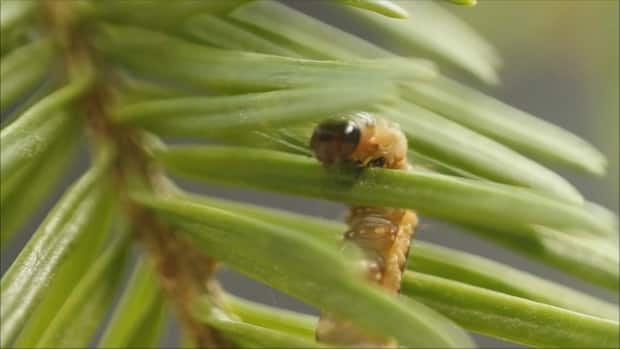N.B. forests have dodged a devastating infestation bullet, insect expert says

Swift action and the strategic use of a biological insecticide have spared New Brunswick forests the worst of a feared outbreak, Atlantic forestry experts say.
A spruce budworm infestation that swept the province in the 1970s, causing much deforestation and leaving the forestry industry reeling, was poised for a repeat attack in 2016.
But on day two of four days of hearings into pesticide use in the province, Canadian Forest Service insect ecologist Rob Johns said the insecticide BTK has blunted the blow this time around.
Johns said the service adopted a targeted, early-intervention strategy, using the narrow spectrum insecticide to stay on top of "hotspots" as they erupt.
It has been a challenge staying ahead of the much worse infestation in nearby Quebec, Johns said, but it's working.
"Under this early intervention strategy, we've seen no tree mortality and only light defoliation," he said, adding "a little intervention goes a very long way."
In addition, he said, the product poses no health threats and has been approved for use in organic farming.

"What effect is your spraying on the human population?" Liberal committee member Jacques LeBlanc asked.
"Zero effect," Johns said. "All the tests that they've done for BTK, there's been no level at which there has been concerns associated with BTK. There is no toxicity to it. … These insecticides are safe, very little needed and public are generally accepting of them."
Natural Resources Minister Mike Holland thanked Johns and Drew Carleton, of the Department of Natural Resources and Energy Development, for their work in heading off a repeat of the spruce budworm outbreak of the late '70s.
"For those of us who are old enough to remember, that was devastating," Holland said.

Farmers union calls for phaseout of chemicals
The committee also heard from Suzanne Fournier, the New Brunswick National Farmers Union executive director, who called for a total ban on aerial spraying of glyphosate in forests and a phasing out of the use of synthetic chemicals in agriculture.
She also asked the committee to investigate the links between chemical use and illnesses in the province.
Our farmers are making less at the end of the day because they are paying to use these chemicals, and this is going to drive agriculture into the ground. - Suzanne Fournier, National Farmers Union in N.B.
Fournier said her organization supports the use of natural pest-management alternatives, including crop rotation, cover cropping and selecting crops suited for particular regions.
Committee member and People's Alliance MLA Michelle Conroy asked Fournier if she thinks it's possible for farmers to keep weeds under control and still turn a profit using these alternatives to glyphosate-based herbicides.
"Yes, absolutely," Fournier said. "Our farmers are making less at the end of the day because they are paying to use these chemicals, and this is going to drive agriculture into the ground if we continue at the rate that we are."
Fournier faced pointed questions from several other members on the committee, including LeBlanc, who asked "what scientific community" she was getting her information from, and whether she had a scientific background.
"I should start by stating that I represent the farmers union but the information is of course assembled from the scientists, which I am not," Fournier said, noting she has a background in political science.
Fournier said she was referencing scientific papers, journals and reports, as well as a 2014 report to the chief medical officer of health in New Brunswick.
The committee also heard from biology professors from Oregon State University and from the University of New Brunswick on Wednesday.
The hearings, which are being live-streamed, continue Thursday and Friday, with presentations from Forest NB, Rod Cumberland, Health Canada's Pest Management Regulatory Agency and others.

 Yahoo Movies
Yahoo Movies 